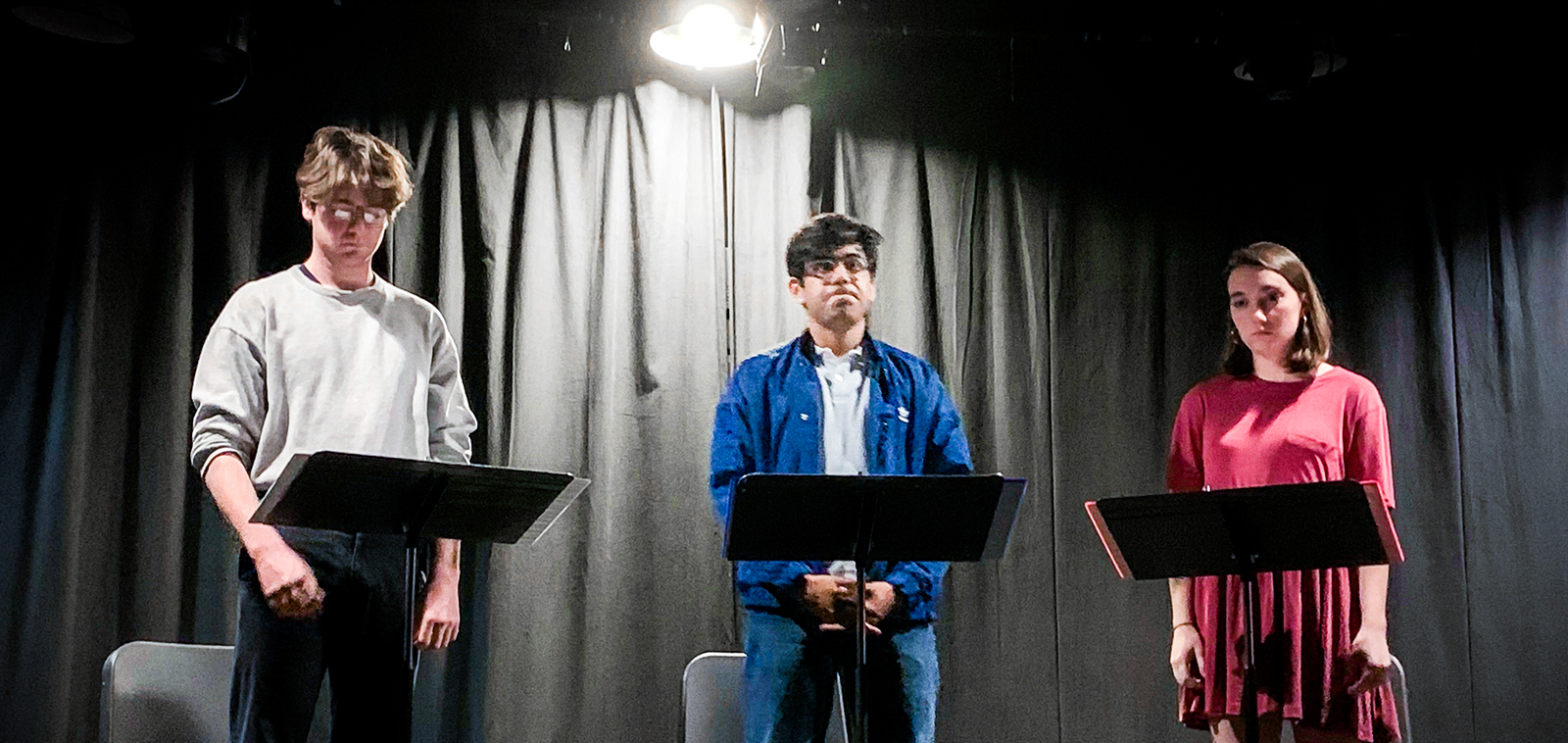Student play features abstract exploration of emotions through colorful characters

First-year theater student Tobias Echeverria (left), second-year theater student Achintya Pandey (middle) and second-year theater student Violet Morris (right) play Grey, Blue and Red, respectively, in Joy Gong’s newest production, “Everything Between Me and My Abstract Desires.” Gong, a second-year theater student, said the staged reading explores the idea of emotions as both colors and people. (Courtesy of Fiona Liu)
By Matthew Chu
Nov. 26, 2019 10:44 p.m.
Joy Gong said her play doesn’t have a beginning, middle or end.
“Everything Between Me and My Abstract Desires” debuted Sunday in Macgowan Hall as part of the Shakespeare Company at UCLA’s new works division. Performed as a staged reading, the second-year theater student‘s play tackles the idea of emotions as both colors and people, delving into abstract sequences of magical realism. The play begins with Red, having murdered her boss, searching for a way to cope with her situation by exploring her complex feelings and desires with the other two characters, Blue and Grey.
“The characters are all looking for something that is not a concrete desire,” Gong said. “But it’s something more abstract, something like wanting a feeling or wanting a sense of achievement. … You can’t just get that by buying it.”
[Related: Costumes in ‘Juana’ bring 17th-century feminist’s story to life]
Gong said the characters’ struggles to fulfill their desires reflect the colors they are named. Red is passionate, desiring to be heard and taken seriously, but her color also manifests in her short temper, making it difficult for others to give her the time of day. Blue is seemingly outgoing, but insecure and melancholic within. Meanwhile, Grey, devoid of colors, seeks to absorb the opinions of everyone else as he struggles to define a sense of self.
The conversations force the characters to confront their inner emotional issues, Gong said. By having Red speak candidly about her crime, Gong said she wanted to humanize the character, discussing an extreme situation as if it were an everyday scenario.
“One of my philosophies is to approach anything that seems outlandish or out of the ordinary with an ordinary approach,” Gong said. “Even though she’s a character who’s obviously killed someone, I don’t want her character to be seen as some sort of maniac or a psychopath or anything like that.”
Instead, Gong said Red is portrayed as a normal person pushed in an extreme direction as a result of complex desires she can’t express in material ways. Gong’s inspiration for the conceptual play stemmed from a philosophy class on Aristotle, who believed human desire exists as an abstract concept.
To express each character’s desires, Gong said the play shifts in and out of conversations and monologues in which each character projects their inner thoughts to the audience. She said her decision to tell the story in a subjective way resulted from her stream-of-consciousness writing process. Because Gong wrote freely, writing anything that came to mind and felt natural, she said the monologue sequences run the gamut from surreal to absurd to comedic.
Second-year theater student Violet Morris, who plays Red, said one scene features Grey suddenly repeating the line “Sometimes, I’m just so tired,” and it’s intentionally unclear of whom or what he is tired of. The ending of the play is equally nebulous, Morris said, since it features the characters casually eating lollipops, acting as if the murder never happened. The scene is meant to be ambiguous, making audiences question where or when the scene takes place in the timeline – that is, if it’s really happening at all, Gong said.
[Related: Cast finds parallels between Nazi Germany-satirizing play and modern politics]
Expressing human desire through abstract sequences, the play aims to showcase what is possible with experimental theater. Third-year theater student Isabelle Smith, who serves as a co-artistic director at the Shakespeare Company at UCLA, said the play’s pursuit of philosophical and abstract ideas embodies the spirit of the Bard of Avon. Although his works have defined the rules for modern playwrights, Smith said Gong’s play serves as a reminder that Shakespeare was an innovator because he tried new approaches to storytelling.
But Gong said she is cautious to impose any particular reading of her play. When it comes to deeper meanings, she said the audience’s interpretation is the most important, as she herself doesn’t have a strict idea of what the play’s more cryptic moments represent. Through sequences that are abstract yet accessible, Gong said she hopes everyone comes away from the experience with a better understanding of themselves as well as her characters.
“I hope the audience understands what these characters are going through, and understands that they might not necessarily know what they want, but kind of connect with that feeling of being lost,” Gong said.


